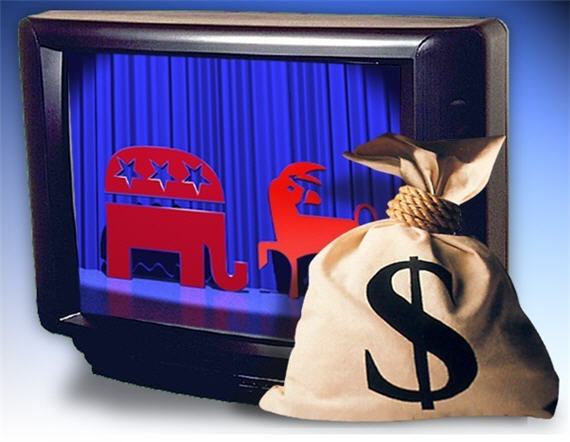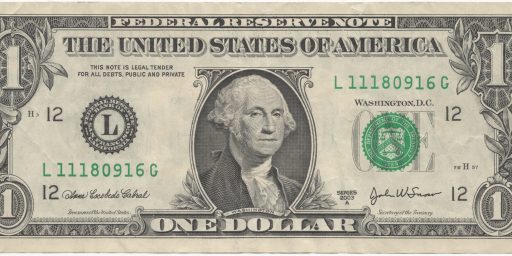Campaign Spending, Free Speech, and Disclosure
The Koch brothers will spend more money in this election cycle than the entire McCain campaign did in 2008.
A startling stat jumped out at me this morning: “The Koch brothers, by themselves, will spend more money in this election cycle than the entire presidential campaign of John McCain in 2008.”
The source is Mark McKinnon, an advisor to the 2000 and 2004 Bush campaigns who has become a leader of such third party movements as No Labels and Americans Elect, appearing on NPR yesterday with Democratic pollster Mark Mellman to discuss what could not only be the first billion dollar presidential race but quite possibly the first four billion dollar presidential race.
While Romney is thus far outraising Obama directly and thumping him in terms of SuperPAC money, both men think that Obama is thus far capitalizing on his funds better.
MELLMAN: But look what’s happened with the Obama campaign and the attacks on Romney with respect to his stewardship of Bain Capital and the decisions, the business decisions he made that ended up hurting a lot of average folks: a lot of crossfire in the press about that – some from a few Democrats, some from reporters, editorialists, others. But you see where those ads have actually been on the air in swing states, it’s made a difference. It’s really damaged Mitt Romney’s image, and it’s helped Obama take the lead in some of those important swing states. So, again, an example where the media didn’t necessarily pick up on the narrative the way the campaign would have liked, but the ads themselves did make some measurable difference.
MCKINNON: And I would just add to that, that that Bain story is the narrative that Obama campaign is trying to establish, and they’ve done a pretty effective job of it. And they’ve done it by spending very heavily, very early. And that’s when you can have the most impact, which is exactly what we did against John Kerry in 2004.
Interestingly, while both are concerned about the impact of this money, both also agree that the vast majority of the money will likely be “wasted” and that the law of diminishing returns will likely kick in well before the billion dollar mark.
In today’s NYT, two former moderate Republican Senators, Warren Rudman and Chuck Hagel–argue in favor of transparency.
Yet what really alarms us about this situation is that we can’t find out who is behind these blatant attempts to control the outcome of our elections. We are inundated with extraordinarily negative advertising on television every evening and have no way to know who is paying for it and what their agenda might be. In fact, it’s conceivable that we have created such a glaring loophole in our election process that foreign interests could directly influence the outcome of our elections. And we might not even know it had happened until after the election, if at all.
This is because unions, corporations, “super PACs” and other organizations are able to make unlimited independent expenditures on our elections without readily and openly disclosing where the money they are spending is coming from. As a result, we are unable to get the information we need to decide who should represent us and take on our country’s challenges.
Unlike the unlimited amount of campaign spending, the lack of transparency in campaign spending is something we can fix and fix right now —without opening the door to more scrutiny by the Supreme Court.
A bill being debated this week in the Senate, called the Disclose Act of 2012, is a well-researched, well-conceived solution to this insufferable situation. Unfortunately, on Monday, the Senate voted, mostly along party lines, to block the bill from going forward. But the Disclose Act is not dead. As of now, it is 9 short of the 60 votes it needs.
The bill was introduced by Senator Sheldon Whitehouse, Democrat of Rhode Island, who deserves tremendous credit for crafting such comprehensive legislation, listening to his critics and amending his bill to address their concerns in a bold display of compromise. At its core, Whitehouse’s bill would require any “covered organization” which spends $10,000 or more on a “campaign-related disbursement” to file a disclosure report with the Federal Election Commission within 24 hours of the expenditure, and to file a new report for each additional $10,000 or more that is spent. The F.E.C. must post the report on its Web site within 24 hours of receiving it.
A “covered organization” includes any corporation, labor organization, section 501(c) organization, super PAC or section 527 organization.
This is a huge improvement over the status quo, where super PACS currently have months to disclose their donors (often withholding this information until after an election) and 501(c) organizations have no requirement to disclose their donors at all.
The report must include the name of the covered organization, the name of the candidate, the election to which the spending pertains, the amount of each disbursement of more than $1,000, and a certification by the head of the organization that the disbursement was not coordinated. The report must also reveal the identity of all donors who have given more than $10,000 to the organization.
In full disclosure, Hagel is Chairman of the Atlantic Council and my boss’ boss. Still, while I’m sympathetic to his argument here, I’m not passing this bill would solve much.
On the one hand, I see little downside to requiring disclosure for major donors. Indeed, while I’m opposed every if not all campaign finance reform effort over the years on free speech grounds, I’ve also advocated for full and speedy disclosure of contributions. While there are speech arguments for privacy for small donors—essentially, the same ones that exist for a secret ballot—they don’t really apply at higher thresholds. Certainly, those who can afford to give away $10,000 are unlikely fear that their boss or union leadership will retaliate and there’s a legitimate public interest in knowing who influences candidates. Giving $200 to a presidential candidate is just enough to get on a mailing list asking for more money; giving $20 million buys regular access.
On the other hand, the problem being addressed strikes me as highly theoretical. That is, we already know who the big donors are. The Koch Brothers, Sheldon Adelson, and others are becoming household names–well, at least in households with political wonks.
Further, while disclosing the names of major donors strikes me as reasonable, I’m dubious of the value in requiring filing of an extensive report every time an organization engages in what the Supreme Court has ruled is political speech. Certainly $10,000 is hardly a major “disbursement” in today’s world; why not raise the threshold to an amount that would really impact a race? And, while I get the need for speedy disclosure very late in a cycle, a 24-hour turnaround seems onerous in July. Especially if it’s required every single time an organization spends $10,000. Why not a single report after a major expenditure (say, enough to buy a statewide television ad in Virginia or Ohio) and an updated report every 30 days for organizations that continue to make big buys?
There’s both a right to speak–and, again, like it or not the Supreme Court has ruled that buying TV ads and the like is speech–and a public interest in knowing who’s pulling the strings. Disclosure of high dollar donors strikes me as a reasonable balance. Onerous reporting requirements for small expenditures, not so much.
UPDATE: Lest readers get the impression this is a purely partisan position, note that I’m on the same side as the ACLU here.
ACLU Urges No Vote On DISCLOSE ACT; Bill Will Compromise Free Speech
[…]
The American Civil Liberties Union is urging senators to vote against the bill because those disclosure requirements are overly broad and inconsistent and will likely infringe upon the free speech and privacy rights of Americans.
The Democracy is Strengthened by Casting Light on Spending in Elections (DISCLOSE) bill (H.R. 5628) includes a provision obligating many advocacy organizations that wish to speak out on candidates and, in certain situations, political issues, to release the identities of many of their donors, while allowing a few large organizations to preserve the privacy of their donors. The amendment exempts organizations that have over 500,000 members, are over 10 years old, have a presence in all 50 states and whose revenue from corporations and unions is less than 15 percent. By exempting larger organizations that might tend to be more mainstream from certain disclosure requirements, the bill inequitably suppresses only the speech of smaller organizations that might be more controversial, and compromises the anonymity of small donors.
[…]
“The ACLU supports the disclosure of large contributions to candidates as long as it does not have a chilling effect on political participation, but the DISCLOSE Act would inflict unnecessary damage to free speech rights and does not include the proper safeguards to protect Americans’ privacy. The bill would severely impact donor anonymity, especially those donors who give to smaller and more controversial organizations.”
So, disclosure good; this specific set of disclosure requirements, bad.
Correction: The original mistakenly misidentified Rudman as a Democrat.







9 votes? It is dead.
As Justice Kennedy recently observed, the campaign spending, whether by individuals or by corporations, “do not give rise to corruption or the appearance of corruption.”
I think any analysis of our system, with Koch-style funding, is going to suffer sampling error(*). What is the counter-factual? Who are the candidates and what are the issues that would have arisen in a more democratically funded context? We’ll never know.
To assert that this is the best of all possible worlds is to leap blind.
* – I think I’m missing the exact fallacy name
But what about corporate donations, James? Shouldn’t the political contributions made by corporations be public, so the voters can decide if they matter and consumers decide whether or not they will impact their choices?
BTW, I don’t know if you plan covering the news that Canadians are now richer than Americans.
I see this as totally related. There are probably a lot of interesting theories about why we’ve lost the North American wealth crown, but one thing seems to be a safe bet: we’ve spent 20 years on polarized political battle and not on problem-solving.
To paraphrase the President, the Koch brothers are not the solution, they are the problem.
@James Joyner:
Those are the biggest public donors.
There very well may be a bigger donors out there giving to 501(c)(4) organizations thus keeping their donations hidden.
Now, I doubt that all this money will have a major, game changing, effect on the Presidential election, but it most certainly will on House and Senate elections.
Well argued James. Without a doubt, its hard to find any rational defense for the idea keeping large donations secret is necessary in order to protect “free speech.” I find it really disturbing that some folks, in particular many conservatives, argue against disclosure.
Not only is it a defense of cowardice , but one must seriously ask why someone is donating to a cause that they don’t want to be publicly associated with?
However, I still have a hard time groking the notion that a 501(c)4’s, like Crossroads GPS, are not political entities and therefore regulated as such.
Justice Kennedy:
The reflexive Republican fillibuster along partisan lines, over something they supported previously, prevents the transparency Kennedy imagined. Classic bait-and-switch. Classic Republican hypocrisy.
Rove’s Crossroads GPS has spent nearly $100M without disclosing where the money came from or where it has gone. So much for transarency.
In June Romney raised $106M. $83.8M of that came from just 6% of the donors. Talk about being in the pocket of moneyed interests. Does anyone think Romney will be able to stand up to donors like that? Romeny does not disclose bundlers. Obama does. So much for transparency.
I think it’s a ghastly irony that so many of the usual suspects who reflexively shout “privacy”, well, pretty much in every other political context, when it comes to campaign disclosure issues, however, are entirely OK with a federal law that would require disclosure of personal info of anyone who contributes over $10,000 to a PAC, etc.
James, one question… what do you consider to be the boundary between “small expenditures” and “high dollar donors”?
Also, a quick glance at the ACLU excerpt suggests that while they may agree with you that the specific proposal is a bad one, it seems to me that they have an entirely different rational for *WHY* it’s bad.
FWIW, the Canadian system of federal election funding looks very rational. The only place it falls down is that it is not ideologically pure.
Ah well, the reason I tend to support Democrats, even as an independent, is that they don’t seem quite so set on a cycle of ideological decline as the Republicans. The party of Norquist is not about good governance. Heck no, good governance is a communist plot.
First — Rudman was a Republican senator, not a Democrat.
Second — “Certainly $10,000 is hardly a major “disbursement” in today’s world; why not raise the threshold to an amount that would really impact a race?”
For a Presidential race, yes $10,000 is a rounding error. On the other hand, for a Congressional race, where a challenger may only spend a few hundred thousand in the whole campaign, it is not.
Third — I see this as remarkably parallel to health care. The Democrats propose something, while the Republicans make a counterproposal. The Democrats fail to pass their proposal (health care) or their proposal is overturned (campaign finance), and then try to enact the Republican proposal, and Republicans then turn on their prior proposal and denouce it. And the so-called liberal media never ever calls them on it.
I personally am in favor of unlimited donations.
However I believe there should be full disclosure of ever dollar contributed to a campaign – whether by individuals, by corporations, or by individuals to an umbrella PAC..
All of it should be disclosed no later than 14 days from the contribution, and posted to an FEC website and available to the public. I would also prohibit contributions to a campaign in the last 14 days of the campaign.
From yesterday:
http://content.usatoday.com/communities/onpolitics/post/2012/07/romney-campaign-declines-to-name-bundlers/1
@mattb: I agree on Crossroads type organizations. There’s some actual distinction between issue advocacy and campaign spending, although drawing the line is next to impossible and Citizens United ended much of the legal distinction.
@Moosebreath: The distinction between presidential and congressional races is a fair one. Maybe the rules should be different for each.
@mattb: Mostly because they’re reacting to the bill in whole and I’m reacting to the provisions discussed in an op-ed. I haven’t studied the bill enough to have a firm opinion on the other issues the ACLU raises but I’m likewise dubious of granting privileged status to older, larger groups when it comes to free speech.
@al-Ameda: Aside from being unconstitutional, limiting speech in the most crucial part of a campaign seems odd to me.
@James Joyner:
As well you should be. I was just pointing out that the ACLU didn’t seem to be questioning the $10K threshold issue/onerous reporting issues you were discussing.
Probably its worth thinking about this on at least three different levels: House, Senate, and Presidential elections — since the economics shift on each level.
C’mon…Rove is not doing issue advocacy.
@al-Ameda:
@James Joyner:
Instead, information about donations should be disclosed within two days.
There’s no reason why that should take up to two weeks, and it would make it almost impossible to do major, undisclosed, donations in the most crucial part of a campaign.
@James Joyner:
I suggested that (no contributions in the last 14 days) in order to try to keep last-second donations from being undisclosed.
Also, I forgot that, according to Justice Kennedy, there is no appearance of corruption associated with campaign contributions, there is only actual corruption, which is to be determined well after the election is safely in the bag.
We should remember that there were tenuous jumps from “speech equals money” and “corporations are people” to free spending. In a parallel universe America, a more pragmatic one, a simpler definition of speech may have prevailed.
If you look at the Supreme Court holding in Citizens United, it seems clear that the majority expected once they established the principle of unlimited expenditures, Congress would pass disclosure laws aimed at curtailing the likely abuses of vast spending by hidden donors .
Unfortunately, they did not realize- or maybe did not care- that the Republicans, who are hugely benefited by just this type of abuse, would fight tooth and nail to protect just this type of “abuse” and would march in lockstep to preserve this advantage.
I have predicted that NO disclosure law, no matter how artfully written, will every pass Congress so long as the Republicans are capable of filibustering such a law, and I stand by that prediction.
Its nice that Mr. Joyner has suggestions as to how to improve the present bill, but the cold, hard fact that the Republicans would block a perfect disclosure bill.
@stonetools:
The Supreme Court was, rightfully, not asked to create a campaign disclosure law, that is for Congress to do. Unfortunately, Republicans control the House and have sufficient votes to tie up the Senate. The people voted this dysfunction.
Well…except when it comes to women’s reproductive organs and who can marry who.
One of the rare times I vehemently disagree with the ACLU. Calling the spending of money on on politics “free speech” is a travesty. There is no right to a “secret checkbook” akin to a secret ballot when it comes to politics. And there is a compelling public interest in knowing who exactly it is who is buying our government every two years.
@Tlaloc: The problem is that, at a modest level, donating to campaigns is almost entirely about expression and has next to no corrupting influence. Whatever interest the public could possibly have in knowing who gave $500 to a campaign is outweighed by the chilling effect disclosure would certainly have. It brings people under scrutiny from employers, unions, colleagues, family members, etc. who have no right to know who they support politically. At some much higher level, the ACLU and I agree, that gets outweighed by the real potential for influence peddling.
@al-Ameda:
I have a sneaking suspicion that one reason Roberts did not join the dissenters to overturn the ACA was that he saw how the Republicans screwed the pooch by not passing campaign disclosure laws after promising to pass such laws.He decided “Lesson learned: the present Republicans can’t be relied on to do the right thing.”
@James Joyner:
My guess is that if you have the ACLU lobbyist truth serum he would have supported the law had there been a chance it could have passed, on the ground that it was better than the status quo. Unfortunately, since passage was impossible the ACLU just held to its maximalist position.
I could’ve sworn I read somewhere that only one organization fit that description.
From a different angle, for all the concerns legit and otherwise about chilling effect, the phony charities are indistinguishable from simple money launderers. Anonymity and untraceability, if allowed to persist, guts practical enforcement of the few remaining anticorruption laws.
@stonetools:” If you look at the Supreme Court holding in Citizens United, it seems clear that the majority expected once they established the principle of unlimited expenditures, Congress would pass disclosure laws aimed at curtailing the likely abuses of vast spending by hidden donors.”
@al-Ameda: “Unfortunately, Republicans control the House and have sufficient votes to tie up the Senate.”
Citizens United was announced Jan. 21, 2010. A week later the POTUS slammed the Supreme Court in a way that overshadowed whatever legislation he was reccomending. The Republicans came to power in 2011. I can only conclude the policy is not that important, its the politics that are.
I remember one incident well — when working for the County government (name withheld), I received a request from the Democratic party (or a prominent member; don’t remember which) for a donation. The only way they could have gotten my name was from the county employee roster.
Was donating to the Democratic Party a precondition to keeping my job?
I have a reflexive distrust of government — largely because of how long I’ve worked for government. Revealing my name to the public would be bad. Revealing my name to the government would be worse.
Caveat emptor.